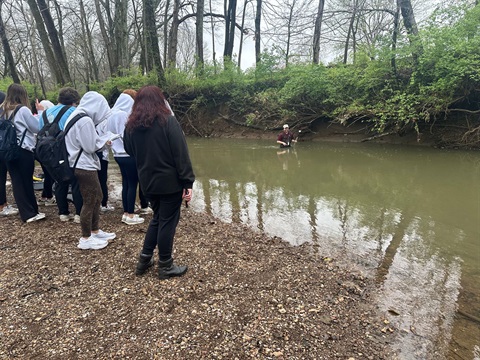Education and Outreach

What is Stormwater Runoff?
Stormwater runoff is rainwater or snowmelt that flows over surfaces like streets, parking lots, lawns, and roofs, instead of soaking into the ground. This runoff can pick up pollutants like oil, chemicals, dirt, and debris, which can then enter local water bodies and wetlands. To protect these resources, communities, construction companies, industries, and others, use stormwater controls, known as best management practices (BMPs). These BMPs reduce pollutants and/or prevent pollution by controlling it at its source.
Some Examples of Stormwater Runoff Include:
-
Water flowing down a street gutter during a heavy rain.
-
Rainwater running off a parking lot and into a storm drain.
-
Water draining from rooftops and collecting in driveways.
Why Does Stormwater Runoff Matter?
Stormwater runoff matters because it can carry pollutants into local water bodies, affecting both our environment and our health.
Here's why pollutant-laden stormwater runoff is a concern:
-
Pollution Spread: As runoff flows over surfaces like streets and parking lots, it picks up pollutants such as oil, heavy metals, pesticides, and chemicals. These pollutants can then be carried into rivers, lakes, and streams, where they can degrade water quality.
-
Harm to Aquatic Life: Pollutants in stormwater runoff can be toxic to fish, plants, and other wildlife. This can disrupt ecosystems, harm habitats, and reduce biodiversity.
-
Impact on Drinking Water: Contaminated runoff can eventually reach sources of drinking water, posing potential health risks to residents. Properly managing runoff helps ensure that our drinking water remains clean and safe.
-
Public Health Risks: Stormwater runoff can carry harmful bacteria and viruses that can lead to waterborne diseases and affect the health of the community.
-
Ecosystem Disruption: Excessive nutrients from fertilizers and other sources can cause algal blooms in water bodies. These blooms deplete oxygen in the water, harming aquatic life and disrupting natural processes.
Managing stormwater runoff effectively helps reduce pollution, protect our water resources, and safeguard both environmental and public health.
Explore Our Informational Flyers and Links for In-Depth Learning
Stormwater Pollution Surface Cleaning Pamphlet(PDF, 1MB)
Landscaping Gardening & Pest Control(PDF, 2MB)
TN Litter Law(PDF, 76KB)
Water Works Construction Guide(PDF, 5MB)
Adventures of Stormy Kids Coloring Book(PDF, 4MB)
Illicit Discharge Examples(PDF, 998KB)
EPA: Stormwater Information Kids Page
Water Quality Riparian Buffer(PDF, 1MB)